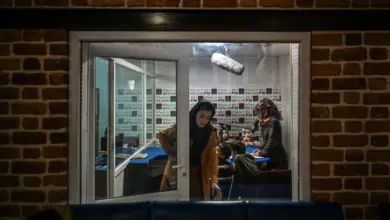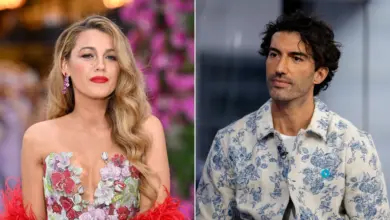Every time an Egyptian woman leaves her house she must make a lot of calculations. What should she wear? Are her clothes too revealing or too tight? What she is going to ride in and should she walk alone in the street or have a man accompany her? All precautions have to be considered in private in order to minimize her chances of being groped or harassed in public.
With bitterness and finesse, the movie explores the psyche of a harassed woman, emphasizing the level of emotional harm inflicted on her when the privacy of her own body is violated by cold-blooded strangers. A plethora of negative emotions are explored. Torn by frustration, self-hatred and a resilient revenge impulse, she remains disoriented about how to react to such an affront in a society that still blames the victim for “failing to protect her body”.
“Everyday I ride the bus and everyday I get harassed. How, after all that, do you want me to be rational?” With this question, Fayza Abdel Maksoud, one of the movie’s three main protagonists, hits a sensitive nerve with the majority of Egyptian women. Nearly 80 percent of Egyptian women experience public sexual harassment including explicit comments, groping, men exposing themselves and assault. Yet, less than five percent of the victims report it to the police, according to a women’s rights group.
Abdel Maksoud is a middle-class civil clerk married to a security guard. Everyday, she rides overcrowded public buses. While stuck on her long journey to work, she has to deal with men who push their bodies against her or even unzip their pants to rub their genitals against her.
Unable to mention it to her husband, Abdel Maksoud finds refuge in a weekly class given by a bourgeois feminist on how to defend oneself against sexual harassment. The instructor, Seba Sami, is no less psychologically devastated than her student.
Sami is an upper-class artist, living with her handsome husband, Sherif, in an opulent mansion in Cairo. Sherif is a fervent football fan and decides to take his wife to a match. Amazed by the Egypt’s victory, the couple walks out of the stadium with the crowd whistling and raising Egypt’s flags.
But this jovial moment turns into one of the most dramatic junctures in Sami’s life when she suddenly gets trapped in an all-male crowd without her husband. In a dimly-lit slow-motion scene, trapped Sami shouts her husband’s name as the men grope her body.
Shocked by the scene, Sherif abandons his traumatized wife and, in her disappointment at his reaction, Sami asks for a divorce. In the meantime, her parents dissuade her from filing a complaint, fearing the social stigma if their daughter goes public. To console her, Sami’s mother reminds her that at least she was not raped.
Meanwhile, another victim decides to break the spiral of silence. Nelly Roushdy is a talented young woman working at the call center of a private company. Frustrated by the continuous verbal harassment she gets from customers, Roushdy finds a good retreat in performing stand-up comedy with her fiancé.
One morning, as she is walking to her house, a truck driver grabs her breast before running away. Outraged by the affront, the brave Roushdy runs after the car and throws herself on the windshield, forcing the driver to stop. She takes him to a police station, but the policeman refuses to register the complaint.
“I made this film to break the silence of women,” said Mohamed Diab, the film’s writer and director. “The short term solution for sexual harassment is that women should not feel ashamed when they get harassed and they should speak out.”
The movie, released this week, is inspired by actual accounts that Diab collected from the local press and through personal interviews. Roushdy’s episode resonates with the true story of a young documentary filmmaker who made headlines in 2008 when she filed a sexual harassment complaint. The case stirred the outrage of many nationalists who alleged that the plaintiff was incited by foreign countries to harm Egypt’s image. Nevertheless, in a historic verdict, the defendant was sentenced to three years of hard labor.
“Sexual harassment is spreading,” said Diab. “It might exist in other countries but women in those countries report it and the aggressor gets penalized.”
Devastated by the same affront, the movie’s three characters react differently. Sami becomes a woman’s rights advocate, advising women on how to address harassment and Roushdy becomes the first women to publicly prosecute her harasser. Abdel Maksoud remains discrete, but not necessarily helpless. She resorts to some brutal tactics, like arming herself with sharp-edged instruments on the bus and, the moment a man approaches, embedding her emery board or eyebrow clamp into his testicles.
“Some people will think I am humiliating Egyptian men, but this is not true; I am humiliating those who commit sexual harassment,” said Diab. “This film will stir a debate, I am sure that I will be severely criticized for it and some people are already sharpening their teeth to attack me with the rhetorical accusation of distorting Egypt’s image.”
In fact, Diab’s movie does not criminalize harassers. On the contrary, it tries to diagnosis the root causes of this phenomenon. One way Diab tries to achieve this is through the character Hamdi, Abdel Maksoud’s husband. Traumatized by daily harassment, Abdel Maksood stops having sex with Hamdi. The sexually frustrated husband ends up watching pornography and harassing women in public transpiration.
Additionally, according to Diab, poverty and commercial obscenity stand as primary causes of the widespread harassment.
“There is a large time gap between the age men start having sexual desires and the age they can afford to get married, and we live in a religious society that prohibits extra-marital sex,”said Diab.
“In the meantime, the world is full of sources of sexual arousal. Look at music video channels, they are arousing men all over the Arab world,” he added.
“Stemming [sexual] oppression and obscenity is the long-term solution,” concluded Diab.
Although Diab’s assessment of the root causes might be oversimplified–a lack of respect for women, more than sexual frustration, is closer to explaining men’s audacity in treading on the turf of women’s bodies, and neither issues justify it–”678” is a worthwhile exploration of the daily plight of the Egyptian woman, a struggle that goes mostly unnoticed by anyone but the victim.




